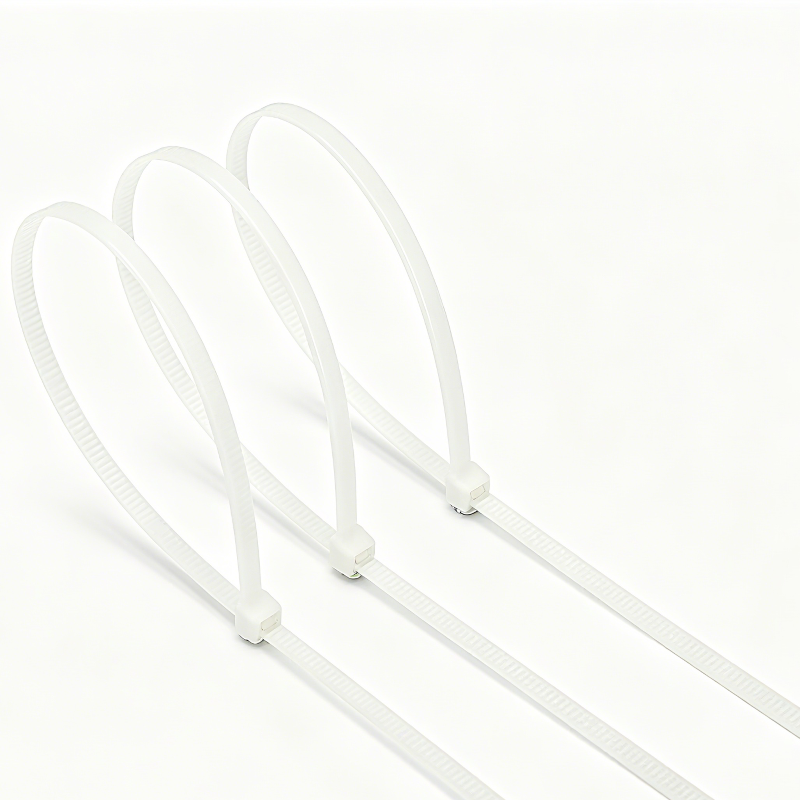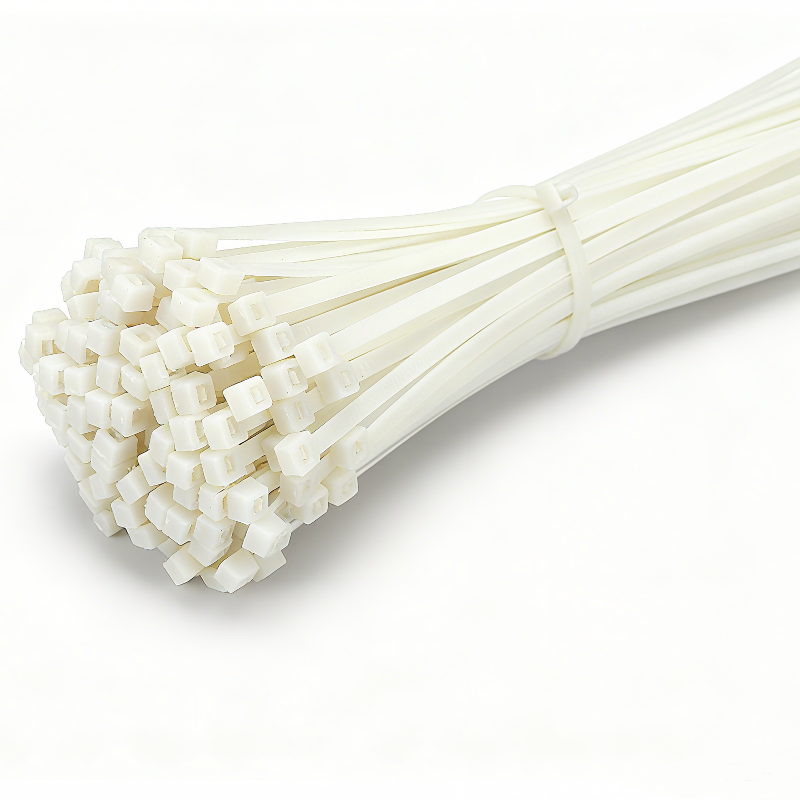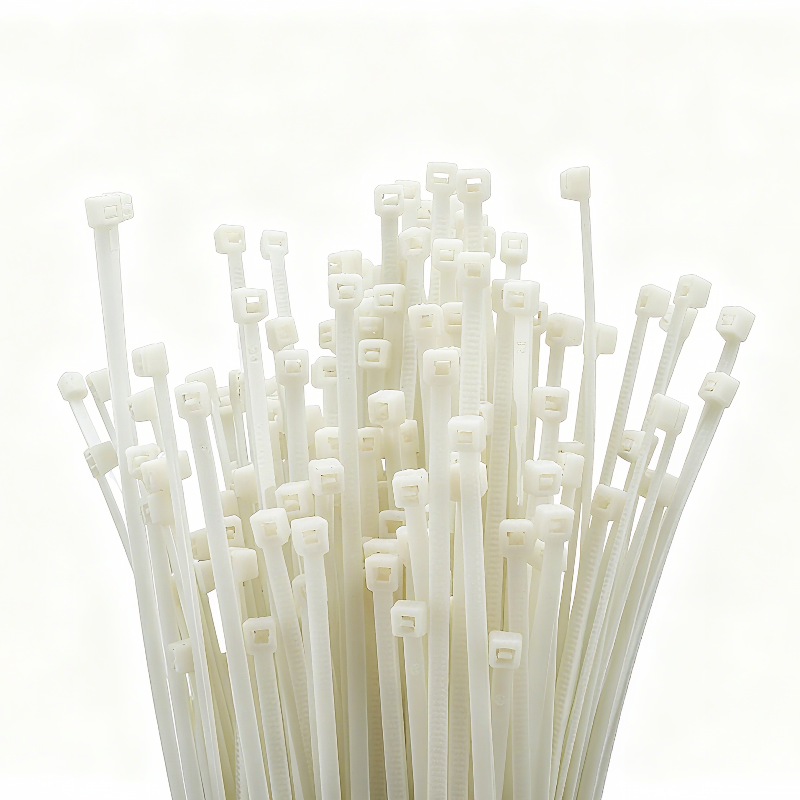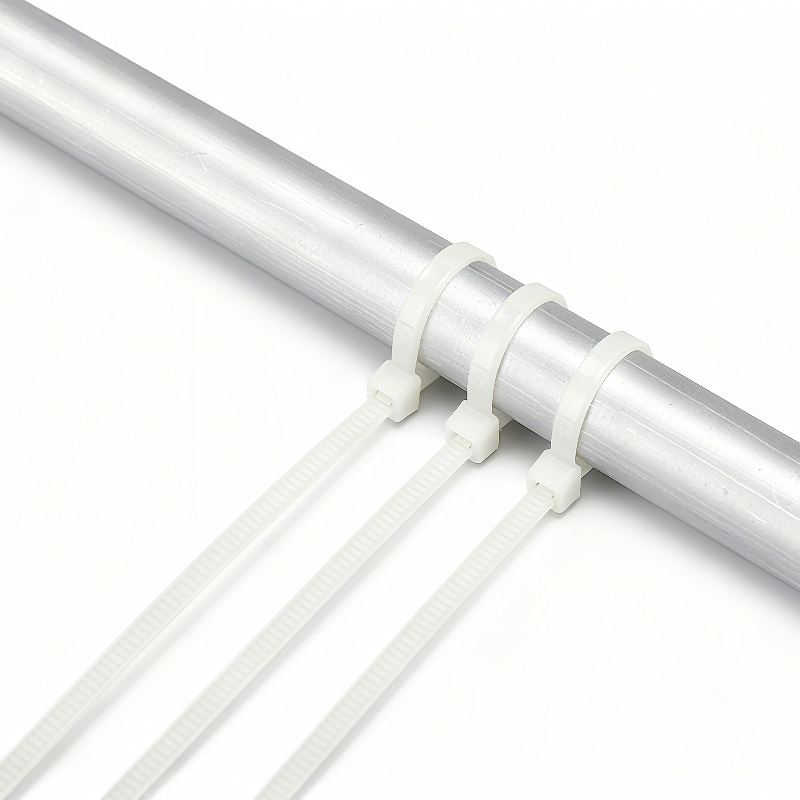What Are Heat Resistant Cable Ties
Heat resistant cable ties are specially designed to withstand harsh high temperature environments. Made from heat stabilized Nylon 66, the unique formulation greatly enhances the product’s heat resistance and anti aging capability. Even when exposed to high temperatures up to 150°C for long periods, these ties resist softening, deformation, or breakage, ensuring long lasting strength and structural stability.
Material: Heat Stabilized Nylon 66
Why choose Nylon 66 instead of Nylon 6?
Nylon 66 has a more symmetrical molecular structure, creating stronger intermolecular forces (such as hydrogen bonding). This means more energy is required to disrupt its molecular chain movements, resulting in a higher melting point and heat deflection temperature compared with Nylon 6. The inherent high thermal performance, combined with the protection of heat stabilizers, creates a synergistic effect that allows long term operation at 150°C. In contrast, Nylon 6 offers lower initial heat resistance, and even with stabilizers added, it cannot achieve the same performance level.
Base Material
Nylon 66 (PA66) is used as the core base material due to its highly ordered molecular structure, providing high temperature cable ties with outstanding mechanical strength and heat resistance.
Additives
High efficiency heat stabilizers are added to the Nylon 66 base to delay thermal oxidation and degradation, significantly extending the service life of heat resistant zip ties.
Operating Temperature
Operating temperature range: -40°C to +150°C, ensuring stable performance in both low and high temperature environments.
Melting Point
Melting point up to approximately 255°C, well above normal working limits, providing a crucial safety margin against overheating.
Advantages
Under continuous high temperatures, heat resistant zip ties maintain tensile strength and resist embrittlement caused by heat aging, extending overall service life.
Tip: Compared to standard Nylon 6 or Nylon 66 ties, heat stabilized Nylon 66 heat resistant cable ties can be used continuously at 150°C, while standard ties can only withstand about 85°C. Increasing the proportion of heat stabilizers enhances thermal resistance and longevity.
Structure and Size Specifications
These cable ties feature a self locking ratchet head and toothed strap, allowing a firm grip when tightened. The table below lists some common sizes of heat resistant cable ties, with custom lengths and colors available upon request.
| Type | Length (inch) | Length (mm) | Width (mm) | Max. Bundle Dia. (mm) | Min. Tensile Strength (lbs) | Min. Tensile Strength (kgs) |
|---|---|---|---|---|---|---|
| WD-3x100HT | 4″ | 100 | 2.5 | 22 | 18 | 8 |
| WD-4x150HT | 6″ | 150 | 3.6 | 35 | 40 | 18 |
| WD-4x200HT | 8″ | 200 | 3.6 | 50 | 40 | 18 |
| WD-5x200HT | 8″ | 200 | 4.8 | 50 | 50 | 22 |
| WD-5x300HT | 12″ | 300 | 4.8 | 82 | 50 | 22 |
| WD-5x380HT | 15″ | 380 | 4.8 | 102 | 50 | 22 |
| WD-8x380HT | 15″ | 380 | 7.6 | 102 | 100 | 45 |
Performance Features and Advantages
1. High Temperature and Anti Aging Resistance
High temperature wire ties can be used continuously at +150°C without softening or deforming. With added carbon black and heat stabilizers, they are ideal for outdoor or sun exposed environments.
2. High Strength Self Locking Structure
The inner teeth of high temp wire ties feature a precise one way locking design that secures firmly once tightened, preventing loosening or slipping for long term reliable bundling.
3. Excellent Insulation and Flame Retardancy
These ties provide UL 94V-2 level flame retardancy and excellent insulation, ensuring added safety in electrical control panels and high temperature areas.
4. Environmentally Friendly and Halogen Free
As an eco friendly product, it fully complies with RoHS and REACH standards. The halogen free formulation ensures safe global use across industries.
Quality Test: Constant Temperature Chamber Test
To ensure the long term stability of Heat Resistant Cable Ties under high temperatures, the product undergoes a constant temperature chamber test.
Test Method:
- Equipment: Constant Temperature Chamber
- Temperature: 150°C
- Duration: 48 hours continuous heating
- Inspection Items: Appearance, tensile strength, flexibility (bend test)
Test Results:
- No visible deformation or melting
- Tensile strength retention ≥ 90%
- No breakage after 10 cycles of bending
This test proves that zip ties heat resistant maintain long term reliability and mechanical stability in high temperature conditions, fully meeting industrial and automotive standards.
Applications
1. Automotive Engine Bay Wiring
In high temperature engine bays, regular ties soften and age easily. High temperature cable ties withstand sustained heat above 125°C, ensuring secure and reliable electronic system wiring.
2. Industrial High Temperature Equipment Wiring
Used for cable management near motors or heating elements in metallurgical and chemical plants.
3. Solar Photovoltaic Systems
In outdoor solar farms, high temperature zip ties resist UV radiation and high temperature aging, ensuring long term safety throughout the lifespan of the installation.
4. Household Appliances
Used around heating units or control boards in devices like rice cookers or microwaves, where heat resistant zip ties prevent long term heat aging and maintain internal wire security.
5. Laboratory Cable Management
In ovens, sterilizers, or analytical instruments, high temp tie wraps offer reliable cable fastening, preventing breakage that could interfere with testing or contaminate samples.
FAQ
Q1: How much heat can Heat Resistant Cable Ties withstand?
Made from heat stabilized Nylon 66, they can operate continuously at 150°C. For higher heat resistance, increase the proportion of stabilizers.
Q2: What is the difference between heat resistant tie wraps and uv resistant tie wraps?
Both include heat stabilizers, but high temperature tie wraps typically contain a higher proportion. UV resistant tie wraps include UV resistant additives instead.
Q3: Are there other materials for higher temperature resistance?
Most heat resistant zip ties are made from heat stabilized Nylon 66. For extreme temperature resistance, materials like PA46 or PTFE (Teflon) are recommended.






